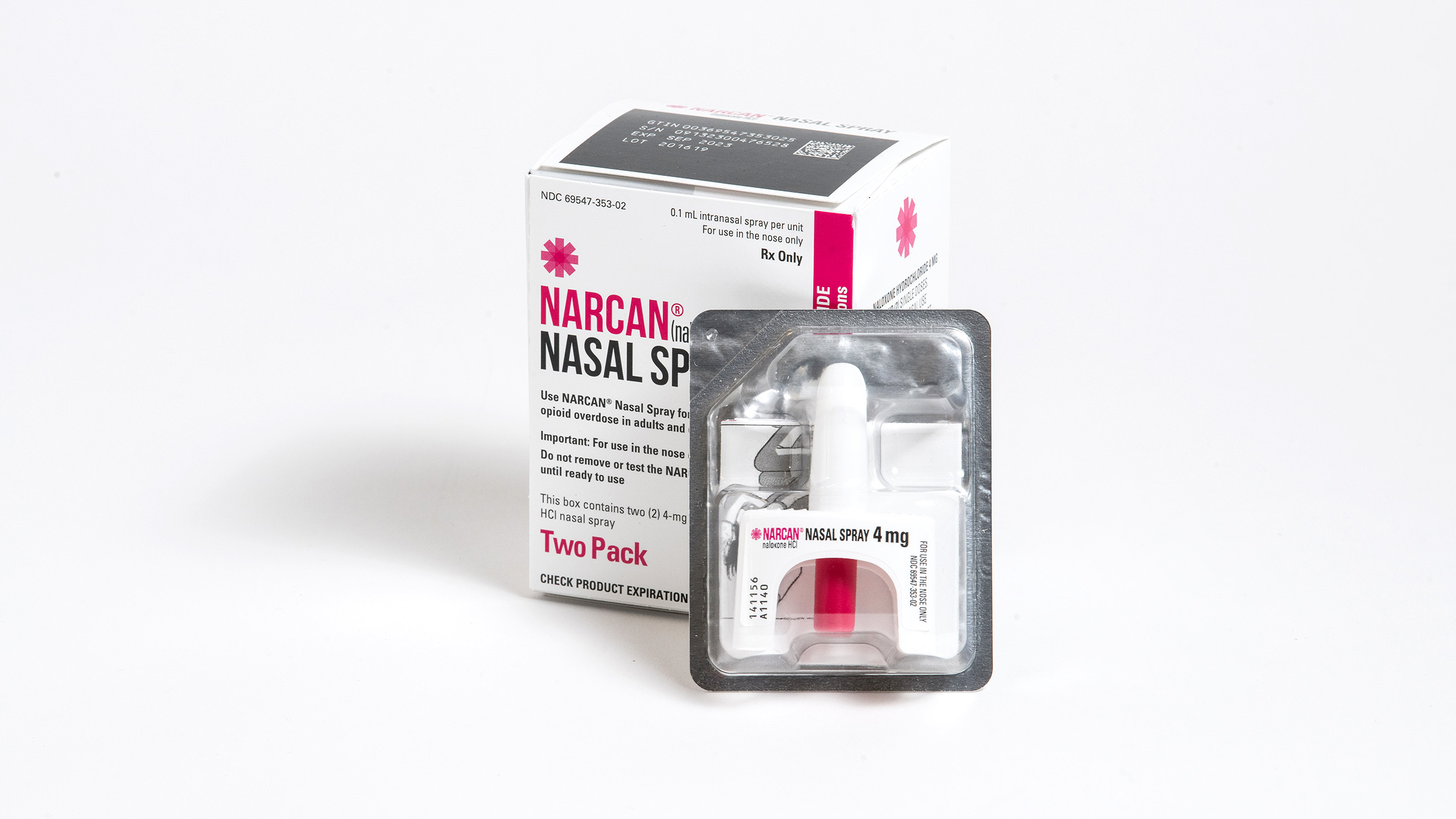Narcan is an FDA-approved drug that can reverse the effects of an opioid overdose. The drug was only available by prescription until recently. With the ongoing opioid crisis, most states have made Narcan available to anyone to purchase from a pharmacy without a prescription.
The U.S. Surgeon General recommends these people have Narcan on hand for overdose prevention because of their heightened risk of opioid overdose:
- People with heroin addictions and those who abuse prescription opioids like oxycodone.
- People in early recovery from opioid addictions, especially those without medication-assisted treatment (MAT).
- People who’ve recently overdosed on opioids.
- People with opioid use disorders who’ve recently been released from prison.
- People on high-dose opioids for chronic pain.
- People who use prescription opioids with other sedating medications or alcohol.
What Is Narcan?
Narcan is a brand name for naloxone. It’s an opioid antagonist. Naloxone binds to your brain’s opioid receptors and blocks and reverses the effects of the opioids causing overdose. Opioids like heroin and morphine slow down the central nervous system. In large doses, opioids can slow these systems down so much that you experience respiratory failure. Naloxone can stop an opioid overdose by reversing the depressing effects of opioids on breathing and the central nervous system.
Narcan is given by nasal spray or injection. It acts quickly — within two to three minutes — but it doesn’t last long. The blocking effects on opioid receptors can wear off in 30 to 90 minutes. Opiate overdose symptoms can return when Narcan stops working. Administering naloxone is only the first step in saving the life of an individual who is overdosing. Call 911 immediately in the event of a drug overdose. They need medical help too. Don’t let fear of getting in legal trouble stop you. Most states have Good Samaritan laws that offer some immunity for the individual who reports the overdose and the victim. After recovering from an overdose, it’s imperative that the victim enter addiction treatment so they can take part in behavioral therapies and get the support and life skills they need to get sober and stay sober.
Narcan reverses the effects of all types of opioids like heroin, morphine, and oxycodone, but it will not reverse the effects of other drug overdoses like those from benzos or cocaine. It’s important to know when and how to use Narcan. Talk to your pharmacist or health provider. There are online resources as well that provide individual, community, and family education and training.
Pros of Narcan
The number one benefit of Narcan is that it saves lives. Over 93,000 people died from overdose deaths in 2020 and 69,710 of those involved opioids. Narcan gives people who are overdosing more time to get the medical help needed to prevent organ damage and death. It can also be a step toward getting the help they need to turn their life around. Surviving a drug overdose can be a wake-up call for some people and carve a path toward addiction treatment and recovery.
Cons of Narcan
Some critics of Narcan believe it gives people addicted to opioids a false sense of security. They argue that if addicted people know they always have Narcan to fall back on, they have less motivation to quit using heroin and other opioids and may even use higher doses. A problem with this thinking is that while Narcan is very effective, there are some cases where it doesn’t work.
There could be other cons as well. Some people may have adverse side effects of naloxone, such as allergic reactions that cause hives and swelling in the throat, face, or lips. It can also wear off prematurely when used to treat respiratory depression from opioids. Naloxone can lead to fluid in the lungs and cardiac arrhythmias in people treated with opioids for severe pain.
When naloxone reverses the effects of opioids, it will cause opioid withdrawal symptoms that could include:
- Diarrhea, vomiting and nausea
- Restless and irritable
- Fever
- Chills
- High blood pressure
- Runny nose and sneezing
- Muscle aches
Supporters of Narcan argue that when weighing the pros and cons of Narcan, withdrawal symptoms are a small price to pay for surviving an overdose with your life intact. They also propose that serious complications for people who experience adverse symptoms from naloxone are rare.
Get Help For Opioid Addiction
Narcan can save a life, but opioid addiction treatment is needed to turn that life around. Narcan is not a treatment for addiction. Without following an overdose with behavioral therapy, support, and relapse-prevention skills, you’ll likely find yourself in the same situation again. A drug and alcohol addiction treatment program will help you address the underlying reasons why you abuse substances. These often include co-occurring mental health disorders, trauma, and environmental factors. Once you understand why you’re self-medicating with drugs, you can learn healthier ways to cope with challenges. An addiction treatment program will teach you relapse-prevention skills and help you begin building a strong support system in sobriety.
Footprints to Recovery offers medical detox programs and inpatient and intensive outpatient options for opioid addiction. Our substance abuse treatment approaches are evidence-based and focus on relapse prevention. Addiction recovery from opioids is difficult but very possible. We’ve seen thousands of clients do it. Call us today to learn more about our addiction treatment centers.
References
- https://www.drugabuse.gov/publications/drugfacts/naloxone
- https://www.samhsa.gov/medication-assisted-treatment/medications-counseling-related-conditions/naloxone
- https://www.hhs.gov/surgeongeneral/priorities/opioids-and-addiction/naloxone-advisory/index.html
- https://www.ncbi.nlm.nih.gov/books/NBK537079/
- https://www.drugabuse.gov/publications/drugfacts/naloxone
- https://pdaps.org/datasets/good-samaritan-overdose-laws-1501695153
- https://www.getnaloxonenow.org/#home
- https://www.npr.org/2021/07/14/1016029270/drug-overdoses-killed-a-record-number-of-americans-in-2020-jumping-by-nearly-30
- https://www.ncbi.nlm.nih.gov/pmc/articles/PMC5753997/#:~:text=Efficacy%20of%20reversal%20following%20naloxone,for%20reducing%20opioid%2Doverdose%20mortality.
- https://www.samhsa.gov/medication-assisted-treatment/medications-counseling-related-conditions/naloxone
- https://pubmed.ncbi.nlm.nih.gov/17367258/
- https://pubmed.ncbi.nlm.nih.gov/15167188/






